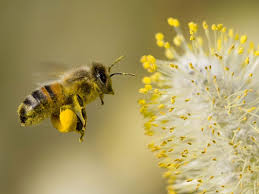中文词源
pollen 花粉
来自拉丁语pollen,谷物粉,面粉,来自PIE*pel,面粉,粉末,粉尘,词源同polenta,powder.后引申词义花粉。
英语词源
- pollen
-
pollen: [16] Pollen originally meant ‘flour’ in English. Not until the 18th century was it taken up as a botanical term. It was borrowed from Latin pollen ‘powder, dust, flour’, a relative of pulvis ‘dust’ (source of English powder and pulverize) and polenta ‘pearl barley’ (source of English polenta [16]).
=> polenta, powder, pulverize - pollen (n.)
- 1760 as a botanical term for the fertilizing element of flowers (from Linnæus, 1751), earlier "fine flour" (1520s), from Latin pollen "mill dust; fine flour," related to polenta "peeled barley," and pulvis (genitive pulveris) "dust," from PIE root *pel- (1) "dust; flour" (cognates: Greek poltos "pap, porridge," Sanskrit pálalam "ground seeds," Lithuanian pelenai, Old Church Slavonic popelu, Russian pépelŭ "ashes").
权威例句
- 1. As the day goes on, the pollen dries up and becomes hard.
- 日子一天天过去,花粉干结成了硬块。
- 2. You can buy a formulation containing royal jelly, pollen and vitamin C.
- 可以买一种含蜂王浆、花粉和维生素C的配方产品。
- 3. Avoid trips to the country while the pollen count is high.
- 花粉计数高时,尽量避免去乡村旅行。
- 4. Hummingbirds have discovered that nectar and pollen are very nutritious.
- 蜂鸟发现花蜜和花粉是很有营养的.
- 5. Nectar and pollen are very nutritious.
- 花蜜和花粉是很有营养的.

